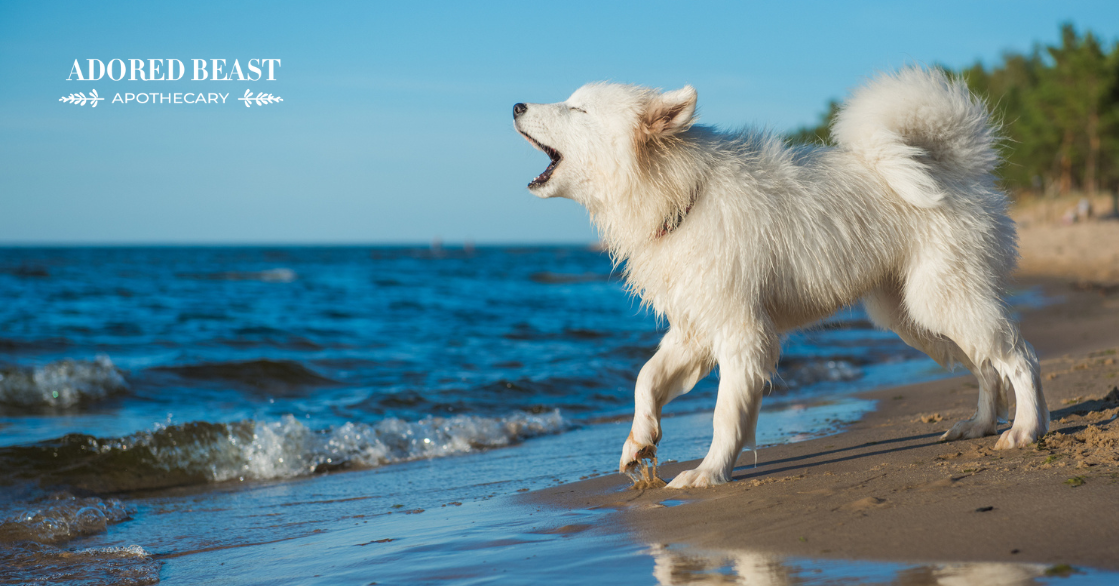Our German Shepherd, Indi, is a barker. She barks at all kinds of things – some make sense to us (people at the door), some don’t (the wind? Dripping water? The broom?). And those barks are all different.
But at no point are any of the barks “bad” – we know she’s not barking to misbehave – she’s barking for a reason (or many, as it were).
Why do dogs bark? As mentioned, barking isn’t “bad” behaviour – it’s natural dog language. It’s instinct. It’s one of the primary ways our pups express themselves and communicate with the world around them.
When your dog barks, they’re trying to tell you something. It might be excitement, a warning, frustration, or even boredom. Just like humans talk, laugh, or shout, barking is how dogs share what they’re feeling in the moment.
Understanding why your dog is barking is the key to supporting them gently and effectively.
Why Do Dogs Bark? The Most Common Reasons
Every bark has a reason, even if it doesn’t always feel that way at first. You can even tell the difference between the different barks if you listen closely.
Here are some of the most common causes:
- Alerting or Warning. Dogs have incredible hearing and a strong instinct to protect. If someone’s at the door or they hear a noise outside, barking is their way of saying, “Hey, something’s happening!” Indi is a big “alerter”…
- Excitement. That happy bark when you grab the leash or come home? Pure joy. Dogs often bark when they’re thrilled to see you or ready for fun. Walk time? Car ride? Beach? Those all illicit barks from our girl.
- Territorial Instincts. When someone or something enters their space, dogs may bark to let them know they’ve been noticed. It’s instinctual, not personal. Again, this is Indi to a T.
- Fear or Anxiety. If something startles or worries your dog, barking can be a self-protective response. This is especially common with loud noises, strangers, or unfamiliar environments. I could say it again, but I think you get the picture…
- Separation Anxiety. Some dogs feel stressed or panicked when left alone. Barking in this case isn’t “naughty” – it’s a cry for connection.
- Frustration. If a dog wants something they can’t reach or feels stuck, they may bark to express that frustration.
- Attention-Seeking. Dogs are smart. If barking gets them what they want – a treat, a cuddle, or your attention – they’ll remember that it works.
- Boredom or Lack of Enrichment. When dogs have energy to burn but nowhere to put it, barking can be their outlet.
- Social Barking. Dogs often respond to other dogs barking or to sounds they find interesting (like sirens). It’s their way of joining the “conversation.”
- Age-Related Cognitive Changes. Senior dogs may bark more as they experience confusion or disorientation – similar to how humans may become more vocal when feeling unsettled.
[RELATED] Rolling in stinky stuff is another common dog behaviour. What’s behind it?
If Barking is an Issue: A Holistic Approach
It’s easy to get frustrated when your dog won’t stop barking. But yelling or punishing won’t fix the problem – and can actually make it worse. Dogs don’t bark to be “bad.” They bark because they’re trying to tell you something.
A holistic approach focuses on understanding the why behind the bark and meeting that need with compassion and support.
Here are some gentle, practical ways to help:
- Observe First. Pay attention to when and why the barking happens. What’s the trigger? Is it when the doorbell rings? Is it a squirrel or a bird outside? When they’re alone? When they’re bored?
- Address the Underlying Need:
- Boredom: Make time for more walks, sniffing adventures, puzzle toys, or brain games.
- Fear or anxiety: Create a safe space, use calming routines, or explore gentle natural supports.
- Territorial barking: Work on boundaries and structured reassurance.
- Separation anxiety: Slowly build independence through positive reinforcement – never punishment.
- Build Enrichment into Their Day. Mental stimulation is just as important as physical exercise. Training games, scent work, and new experiences can calm excess barking by giving their brains something meaningful to do. A tired dog is a calm dog.
- Reinforce Calm Behaviour. Instead of reacting to the bark, reward the quiet. Dogs learn best through positive reinforcement, not fear.
- Explore Natural Calming Supports. Gentle adaptogens, calming herbs, and supportive daily routines can help soothe stress that fuels barking.
Indi is a reactive dog, and barking is definitely an outlet for her. We are always working on ways to address her stress and reactivity (she’s come leaps and bounds over the years, but she still barks A LOT. We love her just the same.). For us, the calm, gentle, holistic approach works better every time.
Always remember, barking isn’t just noise – it’s communication. When we shift from frustration to curiosity, we start to understand what our dogs are truly trying to say. By meeting their needs holistically – with patience, enrichment, and empathy – we help our adored beasts feel safe and understood. And that’s when the volume naturally turns down. Your dog isn’t trying to be difficult… they’re trying to be heard.












